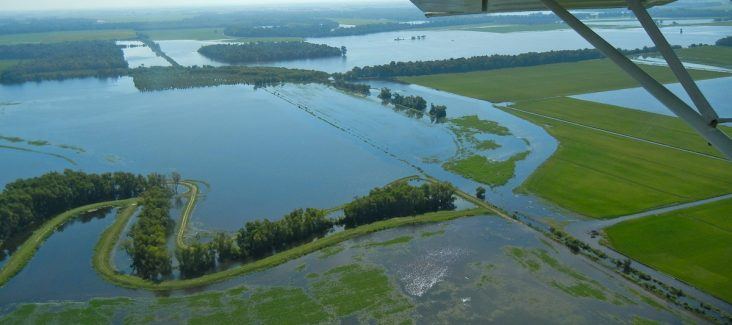Agri leaders discuss Farm Bill, tariffs, brutal weather conditions
by April 20, 2025 7:09 pm 742 views

(Photo courtesy of Lauren Geurin)
Talk Business & Politics recently hosted a roundtable conversation on farming with Agricultural Council of Arkansas President Joe Mencer of Lake Village; Vice President Jeff Rutledge of Newport; Past President and Secretary/Treasurer Nathan Reed of Marianna; and Executive Director Andrew Grobmyer.
The discussion, which is part of TB&P’s newly expanded coverage of federal issues, centered on:
- The latest on how weather, flooding and tornadoes have impacted their farms;
- The need for additional federal emergency and disaster relief; and
- The mental stress and toughness needed to plow through difficult challenges.
“The problem is starting out bad in such a year that we feel like we’re farming to break-even at best,” said Reed, whose farm flooded badly in the storms of recent weeks.
The roundtable participants also shared thoughts on:
- The federal Farm Bill and what needs to be done urgently to help;
- Reference prices and why they need to be raised, prices risks, trigger points, and the need for supplemental assistance; and
- Accomplishments for agriculture in the Arkansas legislative session, especially tax breaks and incentives.
Over the last month, farmers and other business leaders have been grappling with President Donald Trump’s policies regarding tariffs, DOGE [Department of Governmental Efficiency], and a shifting regulatory environment. Here is a sampling of thoughts from the three farmers:
Joe Mencer
“First of all, the DOGE issue, I support that. It has closed down a lot of offices that maybe provided some support for agriculture, but in the long run, there’s a lot of waste that was going on in the federal government. We have to find a way to curb that back so that can free up funds that become available for us one day, maybe, and the programs that we need. In the previous administration, when President Trump was in there, we saw him take these tariff dollars and distribute that into agriculture and into the hands of the people that were hurting with those tariffs. I’m optimistic and hopeful that that’s what will take place in this round. He’s a dealmaker, he’s a businessman, and the government is a business that should be run like a business, just like we have to run our operations.”
Jeff Rutledge
“I think the tariff issue was a positive step as far as trade goes. We’ve been complaining for years about bad actors in the world that have illegally, according to WTO [World Trade Organization] regulations, subsidized the cost of their production of rice and cotton and other products that have come into our country without tariffs on them, while the products that we produce while we are following the rules, get tariffs on those to be imported to those countries. So I think it’s a good policy step as far as trying to level the playing field because we’ve gone through this process for a number of years, trying to go through the WTO through the proper channels to get some kind of relief on this, and nothing has happened. Then you have President Trump introduce these reciprocal tariffs and immediately you have over 70 countries coming to negotiate. To me, that looks like it’s working. But as Joe said, in the meantime, that creates stress for us in our markets. And so anytime the government uses us, uses agriculture, uses our products as a negotiating tool, then we have to be made whole in some way, shape or form for them to be able to use that in those negotiations.”
Nathan Reed
“Speaking of the tariffs, I can give you an example. The United States produces 14 million bales of cotton. We as a country actually consume 25 million-plus bales. But since we don’t have a mill industry in America anymore to speak of, it has to be exported. The issue with that is I think it’s going to be very tough to get cotton mills back in America, but we should be able to do something to get that American cotton back in America after it’s made into a garment right now. I’m very involved in our national cotton industries and we’re the world high on price. We offer a superior product. We can beat them on environmental sustainability, worker safety, standards, quality. We can beat the world on everything right now except for price. We’re being asked to compete against countries in South America where they pay their labor less per day than we have to pay per hour. I’m not complaining about paying my labor, but they [other countries] are not subject to any of the environmental regulations, the environmental equipment on their tractors, smog that we’re subject to. So we just have such a higher cost of production. It’s very difficult for us to produce commodities competing against these other countries and expected to take the same price for them.”
You can listen to the full roundtable here.
